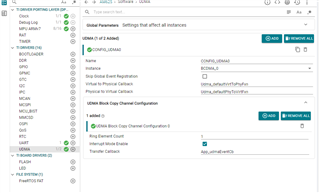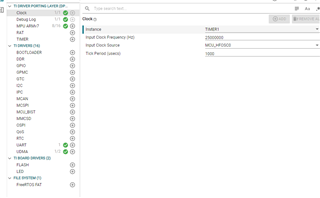Other Parts Discussed in Thread: SYSCONFIG
Tool/software:
Hi,
My customer is planning to use UDMA in MPU+ SDK on AM6232.
Here are environments.
SDK version : mcu_plus_sdk_am62x_11_00_00_16
Sysconfig : 1.23.1+4034
Q1) When UDMA is enabled in sysconfig, it seems TIMER7 is automatically enabled as "Other dependencies".
Is this mandatory for UDMA? TIMER7 cannot be used for other purpose?
Q2) Dpl_init() is called inside System_init() which is generated by sysconfig.
The customer wants to avoid to call Dpl_init(). Is this possible?
HW initialization is done at different part.
Thanks and regards,
Koichiro Tashiro



